

Poetry: Lee Ann Brown. Bodies Can Move This Way Very fast like a car or waterfall Absence gap for stored-up music Evidence for the stolen nonce Your trick is all to the good Our planetary hour takes jumps Drop it doesn't mean stop The fixed will fly perpetually in the blue hour some light reading Silk nets are strongest Morning glories grow best in poor soil Music maker Fire tender Photos stones The air sign to burn Time your desire and circumstance Resistance Play All I need is a little resistance to come to terms All I need is to read you And see how our poems differ where they intersect then fill in the blanks for a new poem Small daily resistances insist on the corrosion of conformity Re sister your self as also an act of kindness to the others who enjoy you You who you pleasurably enjoy your register of pleasure you After Sappho So many people advised me against you.
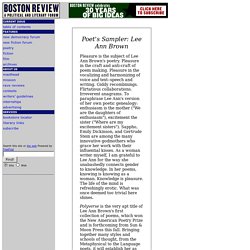
Cafeteria Ice Tea Cream corn Fried okra plus one meat Pledge I pledge allergy to the flail of the United States of Amigo. To Bed. Social Contract - The White Review. Formally, I and the undersigned— What?

Use, like Mama said, your imagination if you still have one where scripts still sway like spring- hipped hula girls on Ford dashboards, where cursive still wraps its tail around your right hand like a pet corn snake, where syntax still stutters, lurches into a sin, a sandwich, a pleasured refrain; if that much of you remains, you’ll see them, us, me (lonely as a broken doorknob), the possible contours of silent manifestos. Poem: My Father Disappears Into Flowers. Poetry forever grants us leaps and blurs.
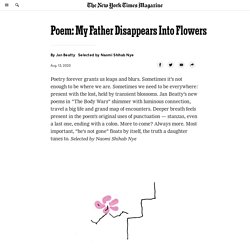
Sometimes it’s not enough to be where we are. Sometimes we need to be everywhere: present with the lost, held by transient blossoms. Jan Beatty’s new poems in “The Body Wars” shimmer with luminous connection, travel a big life and grand map of encounters. Deeper breath feels present in the poem’s original uses of punctuation — stanzas, even a last one, ending with a colon.
More to come? By Jan Beatty The apple tree in the backyard with white waterfall blossoms: my father’s body disappearing in his sickness down to 90 lbs,his hat floating on his head: my father falling into the clothes rack trying to buysmaller pants to fit — he’s not gone The air heavy with waterfall, and him —vaulting down the front steps in spring: Naomi Shihab Nye is the Young People’s Poet Laureate of the Poetry Foundation in Chicago. Illustration by R.O. Crush. Maybe my limbs are mademostly for decoration,like the way I feel aboutpersimmons.
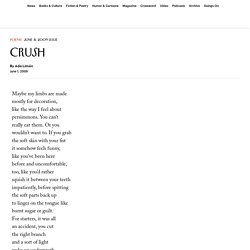
You can’treally eat them. Or youwouldn’t want to. If you grabthe soft skin with your fistit somehow feels funny,like you’ve been herebefore and uncomfortable,too, like you’d rathersquish it between your teethimpatiently, before spittingthe soft parts back upto linger on the tongue likeburnt sugar or guilt.For starters, it was allan accident, you cutthe right branchand a sort of lightwoke up underneath,and the inedible fruitgrew dark and needy.Think crucial hanging.Think crayon orange.There is one low, leaningheart-shaped globe leftand dearest, can youtell, I am tryingto love you less.
The Stepmother – Poetry Daily. Pastoral by Jennifer Chang. 'I Love You' by Vahni Capildeo. 'I love you,' he wouldn't say: it was against his philosophy; I-love-you didn't mean what it meant, plus the verray construction of the phrase caused bad-old-concrete-lawman-vandal-verbal-mildew-upon-the-grape- harvest-and-war-for-rare-minerals-required-to-manufacture-commu- nications-devices damage; saying I-love-you damaged love, subject and object; plus he could prove this in two dense and delphic languages suitable for philosophy, opera, cursing, and racking the nerves of arti- ficial intelligence machines that perhaps could love but would be hard-wired giammai to dare say so.
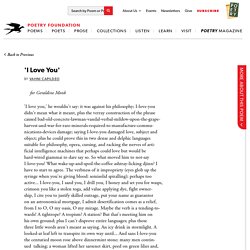
Poems about the V&A: 'Upon A Claude Glass' by Michael Donaghy. Blackened convex mirror known as a 'Claude glass' inside a leather case, England, UK, 18th century.
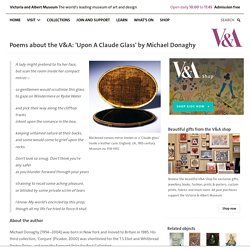
Museum no. P.18-1972 A lady might pretend to fix her face, but scan the room inside her compact mirror – so gentlemen would scrutinize this glass to gaze on Windermere or Rydal Water and pick their way along the clifftop tracks intent upon the romance in the box, keeping untamed nature at their backs, and some would come to grief upon the rocks. Don't look so smug. Don't think you're any safer as you blunder forward through your years straining to recall some aching pleasure, or blinded by some private scrim of tears I know. About the author Michael Donaghy (1954–2004) was born in New York and moved to Britain in 1985.
In 2002 Michael was one of five poets commissioned by the V&A and the Poetry Book Society to create new works inspired by the British Galleries 1500–1900. Download this poem ( PDF file, 60 KB)